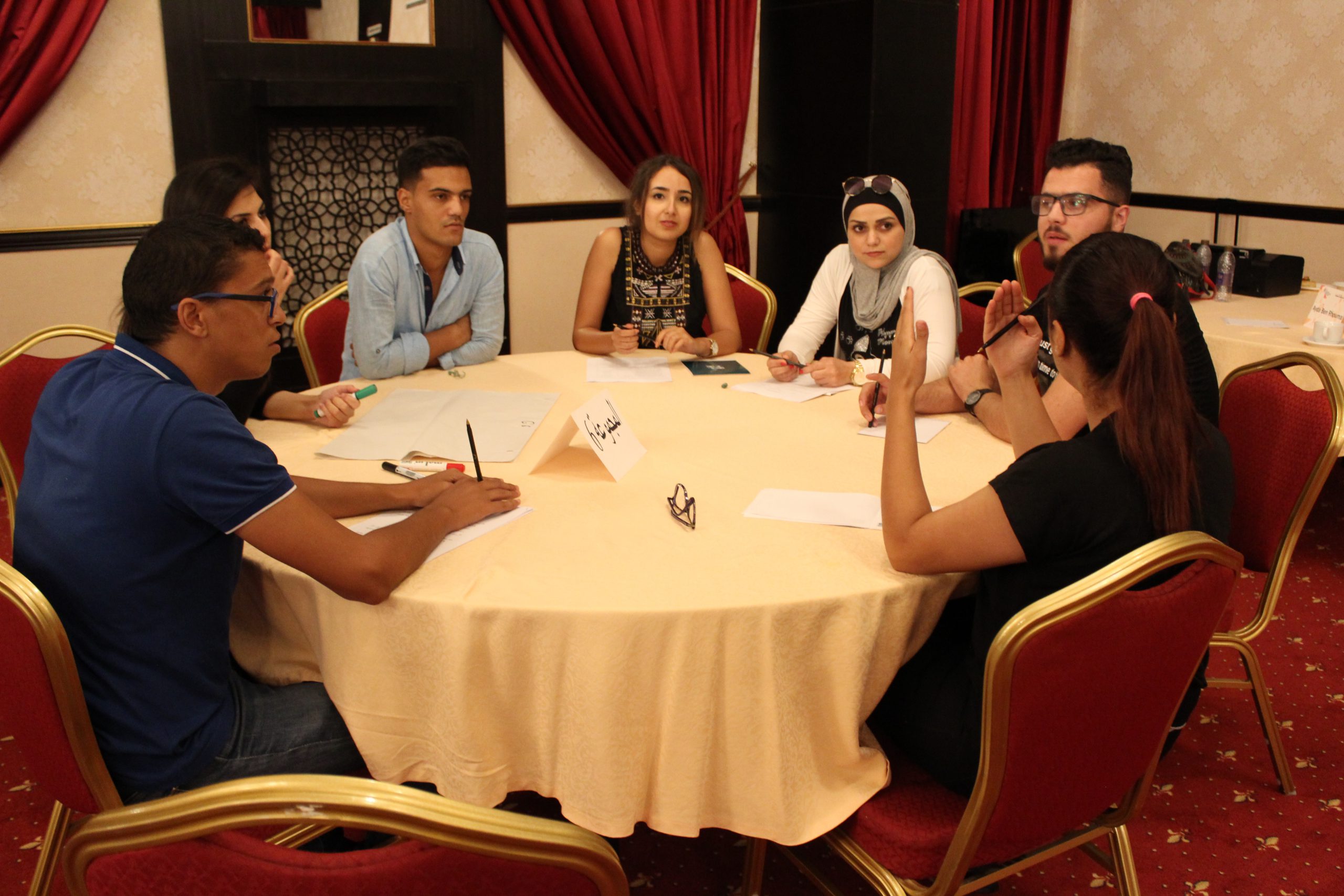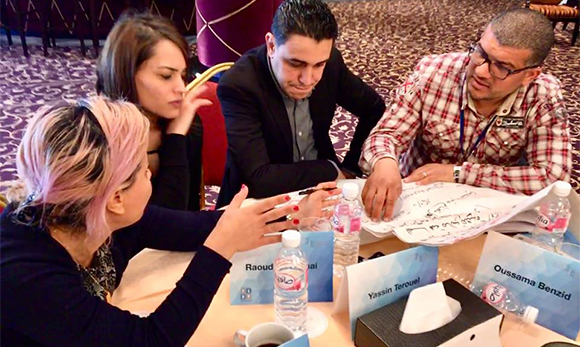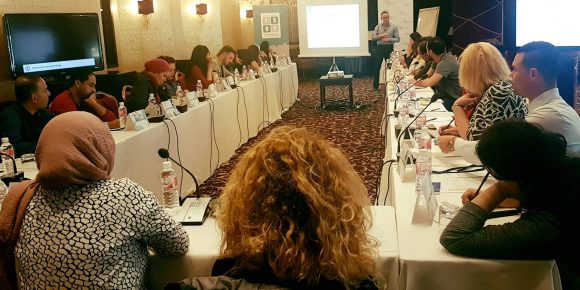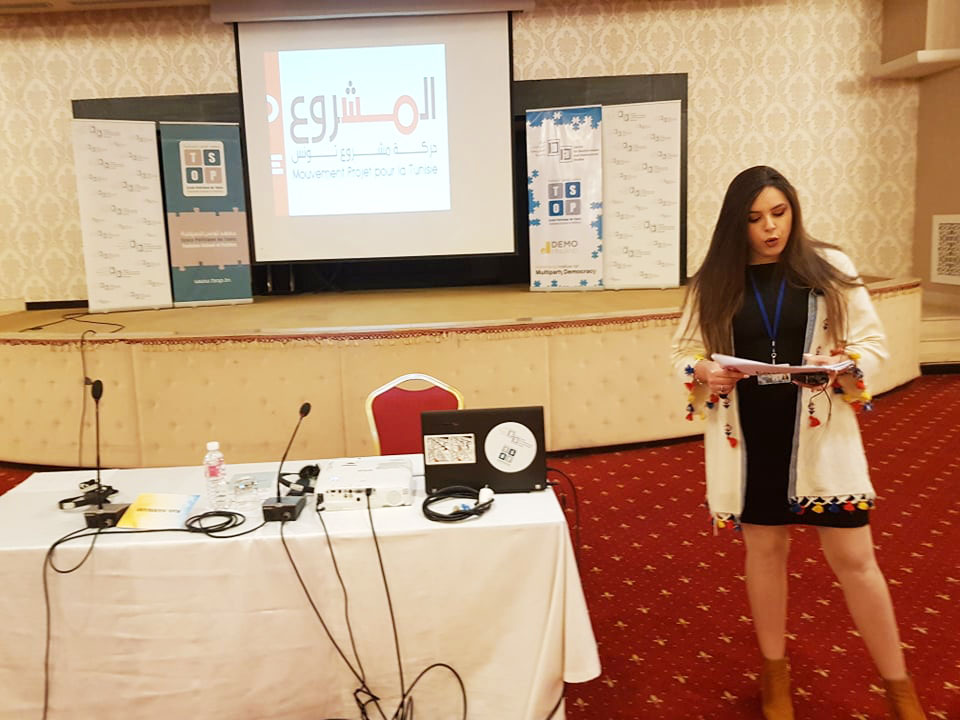
The Tunisian School of Politics (TSoP) has strengthened the skills of young politicians and helped them advance in their careers. It has also made a significant contribution to multiparty dialogue in Tunisia.
These are TSoP’s main results, according to a recently completed external evaluation for the period 2016-2020. The evaluation was carried out by FIANT Consulting Oy.
Throughout the years, TSoP has fostered inclusive multiparty dialogue and strengthened the skills of young politicians by organizing training and events.
TSoP was founded in 2012 by NIMD, Demo Finland and Centre des Etudes Méditerrannéennes et Internationales (CEMI). It is a space for politicians to work together in a multiparty setting and learn the skills and knowledge they need in a multiparty democracy. By learning together, politicians from across party lines get to know each other, This increases mutual trust and encourages multiparty collaboration. TSoP was founded very soon after the Jasmine Revolution that kick-started Tunisia’s democratization. And it quickly established its place in the political field of the country.

Below, we will present some of the work TSoP has been doing over the past 9 years. And we will delve into some of the main findings of the external evaluation.
TSoP: Some key information
TSoP’s basic courses consist of 5-7 training weekends during the year, accompanied with homework and a final exam. Topics covered include public administration and local government; citizenship and civil rights; and budgetary principles. The selection criteria for participants include equal representation of men and women as well as wide geographical coverage.
Between 2016 and 2020, 192 politicians from nine different parties graduated from TSoP while the overall number of alumni throughout the decade is around 500.

Joint statements and friendships across party lines
According to the evaluation, the increase in multiparty dialogue and cooperation has been one of the most important results of the Tunisian School of Politics. CEMI always runs TSoP courses on a multiparty basis, which has given young politicians the opportunity to get to know representatives of other parties.
TSoP alumni have reported increased co-operation with politicians from other parties and with civil society. Thanks to the TSoP courses, they have formed friendships and are in regular contact across party lines.
What’s more, in 2016, CEMI, Demo Finland and NIMD set up a multiparty dialogue platform. This platform brings together high-level representatives from 13 political parties to discuss issues of mutual interest. Its aim is to increase trust and familiarity between political actors. The platform has succeeded in creating a safe space for multiparty dialogue and has offered politicians and party leadership an opportunity to listen to different points of view.
The evaluators estimate that its establishment has been a good achievement in itself. But, in addition to this, the platform has also managed to produce a number of joint statements over the years. These include multiparty statements on, for example, the ratification of the law on decentralization and ethical election campaigning.
In addition to the dialogue platform and training courses, multiparty co-operation has also been promoted by several political debates and events organized by TSoP. Annual regional seminars have brought together politicians not only from Tunisia but also from Algeria, Egypt, Libya and Morocco.
Quality training increases the capacity of youth to take part in politics
The core activity of TSoP has always been providing comprehensive training on politics for young politicians. According to the evaluation, the participants have particularly valued the content and quality of the training. They have been able to use their increased skills and knowledge in their parties, and that has allowed them to proceed in their political careers.

The participants also highlight that TSoP helped them to strengthen their soft skills related to, for example, debating and influencing. Trainings have also increased their self-confidence and motivation to be active in their parties. And their ability to accept diversity and act constructively in politics.
One-third of the alumni have obtained more influential positions in their parties following training. In fact, 54 of Tunisia’s current 217 MPs have attended TSoP activities. In the 2018 municipal elections, 61 out of the 400 alumni ran as candidates, and 27 were elected. These numbers are encouraging especially for the Parliament.
In addition to providing an opportunity for experience sharing between political parties, the programme has also included international exchange of experiences. Before the COVID-19 pandemic halted international travel, a group of promising young TSoP graduates made a study visit to Finland or the Netherlands every year. The visits have offered them the opportunity to get to know different democratic practices and share experiences with local politicians.
Young politicians are the main target group of TSoP. But the school has also organized training for MPs and Executive Bureau members of political parties. In addition, TSoP piloted multiparty training for parliamentary assistants in 2020.
Added value in combining capacity building and multiparty dialogue
Tunisia’s political field has been in a constant state of upheaval since the Jasmine Revolution in 2011. According to the evaluation, there is a growing need in the current context to develop the skills and competences needed in politics and for the facilitation of multiparty dialogue. TSoP is working towards meeting this need. Its main strengths are its high-quality training content and multiparty approach.
Alongside the school, the high-level dialogue platform is a unique space for multiparty co-operation and dialogue. The evaluation also notes that the programme has a unique approach: It provides capacity building for political actors and, at the same time, facilitates a safe space for them to collaborate.
TSoP will continue this highly appreciated multiparty approach. The programme is constantly developing, and we currently have plans to reach young people outside of political parties.
All in all, TSoP seeks to strengthen the active engagement of youth in the society. This will ensure that their voices are heard in the democratic development of their country, and that any reforms take their needs into account.
